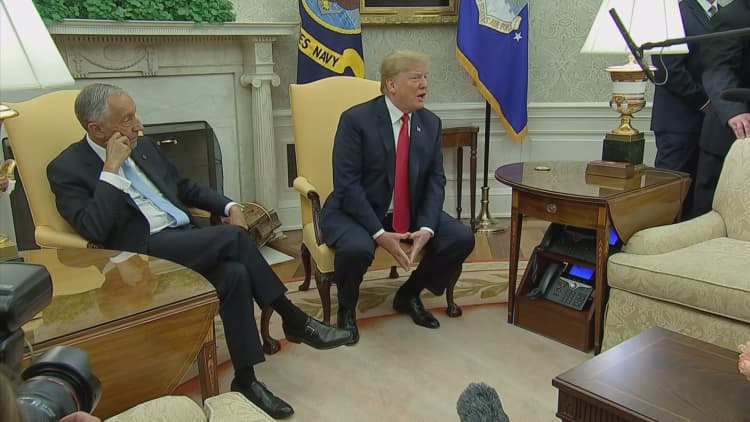Before the kickoff of the Russian World Cup almost a month ago, soccer fans were told to attend the tournament at their own risk, Russia was portrayed as a malignant player on the world stage and Putin was something of a persona non grata.
Several weeks into the tournament and international soccer stars, pundits and the public who have been to Russia have largely had nothing but positive comments and experiences.
The tournament saw the rule book of soccer tradition ripped up too, with some of the favorites — Brazil, Germany, Spain and Argentina — being knocked out early on which made for compelling viewing.
France went on to win the World Cup on Sunday, beating Croatia in a goal-laden final that included an own goal, a pitch invasion and a controversial decision using the video assistant referee, or VAR. The dramatic final typified a tournament that has proved to be exciting, memorable and unpredictable.
The home side Russia, which was ranked in 70th place in FIFA’s table (the lowest-ranked side in the tournament) beforehand, saw unexpected success in the cup which has delighted fans. The national team was knocked on penalties in the quarter finals against Croatia but just reaching that point was seen as a feat in itself.
“I think this World Cup will go down in history as one of the nicest and most successful championships,” Alexander Rahr, a Russia affairs analyst at the German-Russian Forum, told CNBC Thursday. “People were afraid of Russian hooligans but the Russian people have showed they are good hosts.”
“I hope it will give Russia a boost — the people there have never experience so many people visiting. There were thousands of visitors within a month, not just in Moscow and St. Petersburg but in the provinces too — people visiting who would have never travelled to Russia before,” he said.

Breaking stereotypes
Needless to say, Russian President Vladimir Putin is probably loving this World Cup and the positive press coverage it has given his country.
Last Friday, Putin said the tournament — played out without violence between rival fans or major incidents — had helped to challenge stereotypes about his country.
At a meeting with FIFA President Gianni Infantino and former soccer players at the Kremlin, Putin said “many of the stereotypes about Russia have been broken down.”
“Russia is a hospitable country and friendly to those who come to us. Largely, it has been done by the efforts of our football fans.”
FIFA’s Infantino responded that “the virus of football has entered into the bodies of each and every Russian citizen,” he said, adding: “We all fell in love with Russia. All of us, everyone who has been here for some time now has discovered a country that we didn’t know.”
Lothar Matthaus, a former Germany captain, said this World cup had been “one of the best in the past 40 years. Thank you president, thank you Russia.”
Otilia Dhand, senior vice president with risk consultancy Teneo Intelligence, told CNBC that the tournament “is a publicity event designed to project (a) positive image of Russia worldwide.”
“While it has little direct geopolitical relevance, it is a soft power tool meant to improve the perception of Russia abroad among the broad public.”
The tournament comes at a tricky time for Russia diplomatically amid ongoing sanctions for its annexation of Crimea in 2014 and its perceived role in a pro-Russian uprising in east Ukraine.
Allegations of meddling in the U.S. presidential election in 2016, support for destabilizing populist parties in Europe and the poisoning of a former Russian spy in the U.K. have also prompted suspicion on the Kremlin.
As such, the successful soccer tournament has provided some light relief and allowed for diplomatic channels to re-open. When France play Croatia in the final on Sunday, French President Emmanuel Macron will use the occasion to talk to Putin, news agency TASS reported Wednesday.
Economic boost?
Aside from the PR boost Russia has received this last month, analysts will be looking at the economic boost the tournament will have given the economy. World Cup’s are notoriously expensive to host, the infrastructure demands are massive, and the jury is still out over whether the benefits outweigh the costs.
Vladimir Tikhomirov, chief economist at BCS Global Markets, told CNBC that the World Cup had given Russia a public relations and economic boost — but the latter could be short-lived.
“The World Cup is going quite well and it has helped to positively impact the perception in the world of Russia, it is helping tourism to develop after the event is over so I think there will be some positive effect. But I wouldn’t be betting on a significant increase in tourism flows after the event,” he told CNBC Monday.
“Like any major event of this caliber, whether it’s the Olympics or World Cup, they do support the economy of the country so of course you have a big boost to tourism, services, transportation etc so it all helps the economy — the problem is however that it’s usually a very short-lived trend,” he said adding that “as soon as the event is over there is usually a post-event recession and a major fall in all these indices that have shown a very significant rise during the event.”


